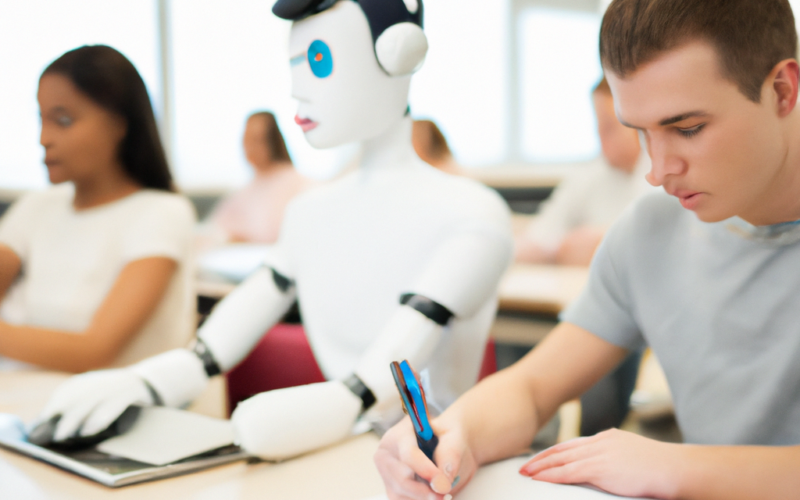ChatGPT and the Future of Cheating
Image created with Dall-E-2 – OpenAI’s Image Generator
Prompt: “students using robots to write their essay”
ChatGPT has seemingly taken the world by storm in recent months, and while it may appear to be a new phenomenon, ChatGPT and other chatbots are by no means new.
The first AI chatbot was created at MIT in 1995 by professor Joseph Weizenbaum, who named it Eliza. While this first model was extremely simple, the complexity of these bots soon began to increase at an astronomical rate.
What sets ChatGPT apart from the rest is its level of complexity, the rate at which it has grown, and the revolutionary algorithms it uses to expand its abilities. Before release, the AI system had been fed over 560GB, which translated to more than 300 billion words, allowing it to answer more than 175 billion different questions at launch (BBC Science Focus). However, what gives ChatGPT and other chatbots like it so much promise is that the more they are used, the smarter they become.
In the months since its release, OpenAI, the developer of ChatGPT, has been valued at more than $29 billion (WSJ) with investments from institutional venture capital funds. There was even a recent $10 billion investment from Microsoft who intended to implant the software into many of their goods and services going forward. This would mean that ChatGPT could be brought to hundreds of millions of users globally in the next decade. Five days after its launch, ChatGPT gained more than a million daily users. However, one issue that has come up since ChatGPT’s rise has been its potential abuse by students; this has been a considerable problem at Grace.
Image created with Dall-E-2 – OpenAI’s Image Generator
Prompt: “teachers discussing the future of cheating amidst chatgpt”
A few months after its release, articles began to sprout up about incidents involving students found using ChatGPT for papers. While the consensus of these articles was that cheating was not a widespread problem, questions remained on whether or not it could become one.
Soon schools across the nation were asking the question of what they could do to stop this. At Grace, the issue of its potential abuse was brought up in a recent staff meetings by the teachers of the academic departments who, like the rest of the nation’s educators, wondered what they could do to stop this.
While to the naked eye, ChatGPT writing may be indistinguishable to the writing of a regular student; it is still the case that ChatGPT, in its current state, has extreme limitations. While it can perform basic commands and mimic basic human conversations with scary accuracy, when it comes to more complex commands, ChatGPT falls short; this is especially true regarding mathematics. Just by using it once, it is evident that much of the writing it generates is compiled entirely from information it originally learned from the internet. However, as ChatGPT gains more daily users, these limitations will become less and less apparent as it becomes smarter and smarter. Only time will tell how long this solution will last before ChatGPT becomes too complex for detectors to use.

